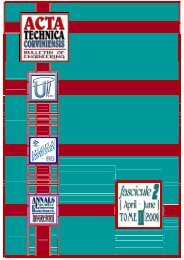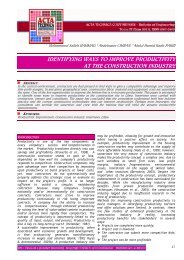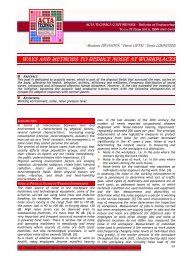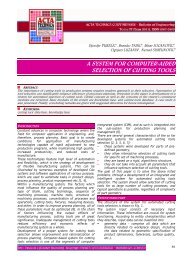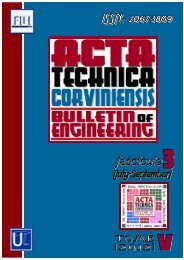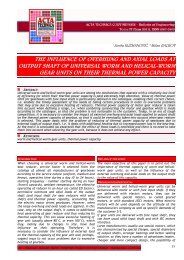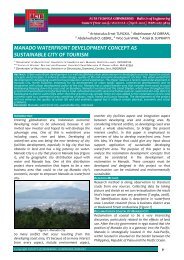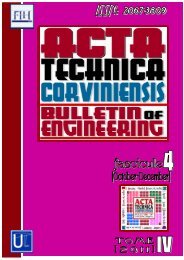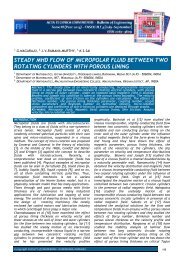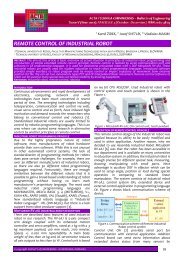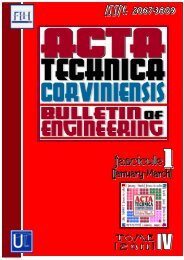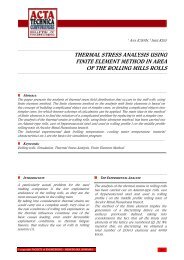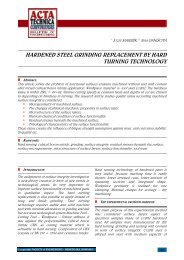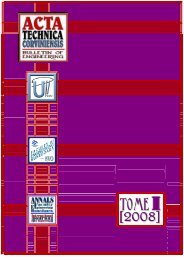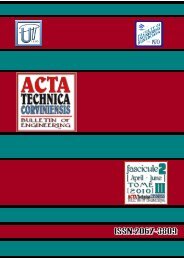a review - Acta Technica Corviniensis
a review - Acta Technica Corviniensis
a review - Acta Technica Corviniensis
Create successful ePaper yourself
Turn your PDF publications into a flip-book with our unique Google optimized e-Paper software.
1.<br />
Maria Mikela CHATZIMICHAILIDOU, 2. Stefanos KATSAVOUNIS,<br />
3.<br />
Chris CHATZOPOULOS, 4. Dusko LUKAC<br />
MASS CUSTOMIZATION AS A PROJECT PORTFOLIO FOR<br />
PROJECT – ORIENTED ORGANIZATIONS<br />
1.<br />
DEMOCRITUS UNIVERSITY OF THRACE, CIVIL ENGINEERING, XANTHI, GREECE<br />
2,3.<br />
DEMOCRITUS UNIVERSITY OF THRACE, PRODUCTION ENGINEERING & MANAGEMENT, XANTHI, GREECE<br />
4.<br />
RHEINISCHE FACHHOCHSCHULE, UNIVERSITY OF APPLIED SCIENCES, DEPARTMENT OF MECHATRONICS, COLOGNE, GERMANY<br />
ABSTRACT: The idea of combining Mass Customization to the Project Management area<br />
stems from their common characteristic of uniqueness. Project Management aims to<br />
meet the organization objectives by manipulating production phases and limited<br />
resources. Being a temporary endeavour, with a defined beginning and end, it<br />
undertakes to meet unique goals and objectives, to bring about beneficial change or<br />
added value. On the other hand, Mass Customization serves the newly emerged<br />
requirements of customized and personalized products. To this extent, we are going to<br />
consider and examine Mass Customization as a strategic goal of a Project-oriented<br />
Organization, which runs collateral projects, in order to achieve its final purposes. For<br />
such a kind of organization, different customized products are considered as multiple<br />
projects of a portfolio. Together with the limited resources, an integrated<br />
environment is composed where priorities and hierarchical rules produce alternative<br />
configurations, which coexist. The paper proposes a dynamic framework, to assist<br />
decision makers in project coordination processes with realistic parameters.<br />
KEYWORDS: Mass Customization, Project Management, Project Portfolio, RCMPSP<br />
INTRODUCTION<br />
Mass Customization seems to be one of the most<br />
interesting and flexible manufacturing systems that<br />
aims to meet customers’ needs under a much<br />
personalized matter. There is a great amount of<br />
companies, which adopt customization and<br />
personalization as their main strategy, aiming to<br />
overcome the ongoing and fierce economic crisis.<br />
Companies [1] with high openness and extroversion<br />
are, de facto, willing to pay the “forfeit” of<br />
maintaining their market share.<br />
Customer-centred approaches imply that industrial<br />
products or even services have to be considered as<br />
unique and of high, both economic and social,<br />
importance due to their complexity and demanding<br />
production processes. Each ultramodern piece is,<br />
beyond question, a project encountered by<br />
companies, on the grounds that it frequently involves<br />
research or design carefully planned to achieve a<br />
particular aim. It is also a temporary system<br />
coexisting with the permanent organization and the<br />
commonplace tasks and procedures. As commonplace<br />
tasks can be considered those comprising Mass<br />
Production but on the contrary, Mass Customization<br />
embodies temporary organization concept.<br />
Along these lines, there is a one-to-one relationship<br />
between products and projects, which, in sequence,<br />
leads to the Project Portfolio aspect. Regarding the<br />
fact that Mass Customization-friendly industries are<br />
likely to produce more than one customized product,<br />
there is an emerging need of technically<br />
manipulating multi-project circumstances, which will<br />
possibly empower empirical management.<br />
To elaborate on Project Portfolio, it is “a set of all<br />
projects and programmes in a Project-oriented<br />
Organisation at a given point in time. It is a timenow-analysis.<br />
For organisations that have a large<br />
number of projects in their portfolio, it makes sense<br />
to have several portfolios for different types of<br />
projects” [2].<br />
When an organization has to deal with a given<br />
number of projects, it predominantly encompasses<br />
obstacles concerning resource planning and time<br />
scheduling. As a matter of course, pertinent<br />
managers correspond to these critical points by using<br />
their experience, subjectivity and their instinct as<br />
well. Nevertheless, there is an acknowledged<br />
approach called Resource Constrained Multi-project<br />
Scheduling Problem (RCMPSP) dedicated to solve this<br />
kind of difficulties. Specifically, it involves the<br />
scheduling of activities of multiple separate projects,<br />
subject to precedence and shared resource<br />
constraints [3]. The aforementioned situation is an<br />
NP-Hard optimization problem having many<br />
applications in large constructions, complex<br />
production lines, and wide logistic chains and<br />
manufacturing Project Management.<br />
© copyright FACULTY of ENGINEERING ‐ HUNEDOARA, ROMANIA 63



